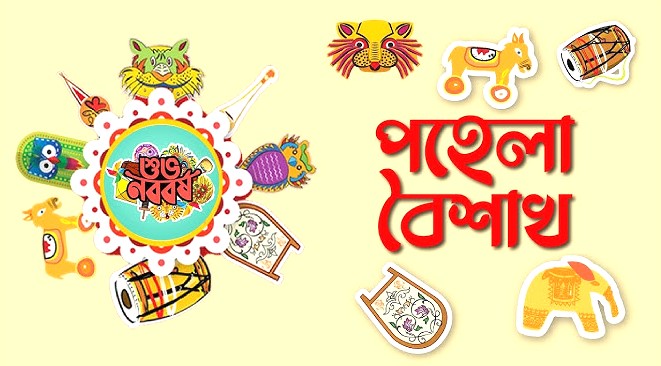
The Journey of Boishakh : The Tradition and Transformation

Among all the festivals that Bengali people observes or are observed in Bengali land, Pohela Boishakh---the Bengali New Year---stands apart as the most authentic and inherently Bengali.
It is woven into the very fabric of Bengal’s timeless heritage---a complete, self-contained celebration embraced by over 30 crore of Bengalis across the world. This is the only festival that encapsulates all aspects of the Bengali soul---joy and sorrow, emotions and aspirations, thoughts and dreams, desires and disappointments, culinary habits---in short, a celebration that truly reflects the very essence of Bengali identity. It is, in essence, a celebration of Bengali identity----deeply rooted in tradition.
On this day, through songs, dance, instruments, traditional attire, and food, Bengalis transform and renew themselves. Pohela Boishakh is our culture. It is our civilization — wholly secular, beyond the boundaries of religion — and it presents to the world a proud, inclusive image of our shared humanity.
Very few ethnic groups in the world have their own New Year. Bengalis are one of those proud, traditional people---with their own New Year, their own language, a powerful script, six unique seasons and a refined culture. Only Bengalis ceremonially celebrate each of these six seasons separately. Outside of Bengal, nowhere else in the world does nature offer such variety — and that, too, is a point of pride.
In this secular cultural celebration, filled with boundless joy, Bengalis rediscover their true identity. From the harvest of rabi crops in Chaitra, boro rice in Boishakh, ripe mangoes and jackfruits in Joishtho, to the heavy rains of Ashar-Shrabon, the breeze in the kash flower fields during Sharot, the Nabanna festival in Ogrohayon, traditional cakes in Poush, and biting cold in Magh — these are all familiar features of the enduring rural lifestyle.
According to Wikipedia, the month of Boishakh is named after the Bishakha star. Throughout the summer, Bishakha roams across Bengal’s land, rivers, and forests, spreading flames of heat. Yet, despite its fierce arrival, Boishakh brings with it hope, beauty, and inspiration. Even as nature endures intense heat, its heart remains nourished by the gentle essence of Bengal. Boishakh inspires the Bengali spirit to embrace the struggle of life with renewed energy, washing away the old and welcoming the new.
The New Year in the Modern Context
Today, this New Year festival has spread far and wide — its appeal no longer confined within the borders of the country. Like other national and social festivals, Pohela Boishakh is now recognized as a national celebration. But it is not a religious celebration. This is the only festival untouched by religious or racial distinctions — a festival that all, whether Hindu, Muslim, Buddhist, Christian, or indigenous, can participate in with pure joy.
There is no class or professional divide here. Farmers, laborers, blacksmiths, potters, weavers, fishermen — people from all walks of life celebrate the Bengali New Year with festive spirit. For over a hundred years, fairs have been held in villages, along riverbanks, beneath banyan trees on this day. These Boishakhi Melas are expressions of the Bengali heart and soul. A variety of handmade items are sold — each reflecting the diversity and creativity of rural life. These fairs are, in many ways, mirrors of village life itself.
On this day, traders open new ledger books — the traditional Hal Khata — marking a fresh financial beginning. Even beyond the complexities of city life, these folk customs endure in rural areas, though modern pressures have somewhat diminished their scale. Still, like the ever-flowing current of folk tradition, the stream continues — perhaps thinner, but never dry.
However, we cannot ignore the opposite picture either. In today’s reality, this has become a complex psychological phenomenon — growing more complicated by the day. Under the banner of “urban culture,” this celebration has become a confusing blend of many forms. It’s often fragmented and distorted. Its character has changed, and many celebrants have forgotten its origins and history.
This so-called “cultured” urban lifestyle, devoid of tradition, is evolving rapidly — swept up in a whirlwind of foreign influences. In our clothing, behaviour, thinking, even in food and education, we are increasingly shaped by outside cultures.
As a result, Pohela Boishakh has, in some ways, become a distorted volume of celebration. We’ve swapped out simple homemade potato fries for French fries from food trucks at parks or in front of Parliament Bhavan. We wander university campuses or shopping malls in shorts, sip morning bed-tea, and reach for frozen American mashed eggplant or pre-packaged Malaysian paratha.
This raises a serious question: Is urban life preserving our traditional, folk-rooted culture — or is it distorting it?
In many instances, what we see is a kind of cultural hysteria — a wave of uncontrolled euphoria and chaotic noise that is even making the national psyche uneasy. Even more troubling is the excessive, urban-centric media coverage of Pohela Boishakh — flashy but disconnected from real Bengali life. While its spectacle may have grown, Bengali identity has little true presence within it. For example, when television channels mark Boishakh with loud, distorted band music, one can only imagine Bishakha herself turning away in dismay.
From grand panta-ilish feasts in Ramna to colourful festivities splashed across newspapers and TV screens, the Bengali New Year is celebrated loudly. But behind the scenes remain the unseen faces — the millions whose hands once built the rhythms of the Bengali calendar. These producers, now half-fed or starving, have been pushed backstage in a festival that was once theirs.
-----------------------------------------------------------
Dr. Amanur Aman is a writer, researcher, Editor and Publisher, The kushtia Times and Dainik Kushtia
He is author of 28 books/
Editor & Publisher: Dr. Amanur Aman, M. Phil (IUK), PhD (NBU-Darjeeling)
Advisor Editor: Ajoy Maitra
Managing Editor: Shanaz Aman, Executive Editor; Mythos Aman
News & Commercial Offices: T&T Road, Thana Traffic More, Kushtia-7000.
Mobile: 01713914570, E-mail: editor@thekushtiatimes.com
All rights reserved © 2022 thekushtiatimes.com